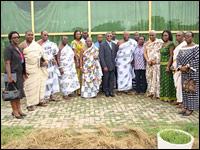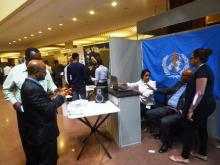WHO Repurposes Ethiopia Country Office Staff for Emergency Response
ADDIS ABABA, 28 December 2015 | The WHO Country Office, in collaboration with the Ethiopian Federal Ministry of Health (FMoH), conducted a one-day induction workshop on emergency response for its repurposed staff and consultants.
In his opening remarks, Dr. Paul Mainuka, Acting WHO Representative to Ethiopia, highlighted that WHO is proactively engaged in working with the Government of Ethiopia to respond to the current emergency triggered by the El Niño weather phenomenon. “WHO internal Grade II Emergency has been declared as per the organization’s Emergency Response Framework. Accordingly, staff have been repurposed, response plans developed and efforts to mobilize resources have been enhanced,” he said. Dr Mainuka further underscored that this unusual situation cannot be overcome with a ‘business as usual’ approach and called on the deployed staff to work even more vigorously and innovatively than before.
In his keynote address, Dr. Dadi Jimma, Deputy Director General of Ethiopian Public Health Institute of the FMoH, noted that the training is timely and the support crucial to the emergency response. He confirmed that the effect of the current El Niño on the country is quite serious, affecting the health system in an unusually wider area of the country. “10.2 million people are in need of food aid and the number of priority districts are now over 100,” he said, “As a result there is an imminent risk of Malaria, Measles, Meningitis, and acute watery diarrhoea (AWD) outbreaks in addition to malnutrition.” Dr Dadi further called for an intensified and continuous support from WHO to the country’s response efforts.
The induction workshop was organized to familiarize staff and consultants to the response modality in Grade II WHO Emergency, and walked the participants through public health emergency management in the context of disaster risk management (DRM) principles and WHO critical functions in emergency. The workshop also covered sessions on the expanded mandate of staff in implementing WHO emergency response activities and responsibilities for health cluster coordination at all levels, standard and regular reporting tools and formats, and the action plan developed for the emergency response. Different teams of the Country Office (Nutrition, Immunization, WASH, Maternal and Child Health, Communicable Diseases, Health Systems and Services) also presented their own programmatic areas that need to be supported and monitored during emergency.
All repurposed staff will be deployed to their respective regions of assignment at the end of December 2015 to immediately assume responsibilities and spearhead coordination, surveillance, preparedness and response activities.
The El Niño weather phenomenon has triggered drought in large parts of Ethiopia causing up to 80% of the 2015 harvest to fail. Flood is also a likely event predicted and manifested in lowland areas of the country following the current El Niño weather phenomenon. As a result, emergency nutrition and health problems related to the current drought are witnessed, increasing the population’s vulnerability to disease outbreaks and other health risks.
The World Health Organization needs US$ 9.5 million to scale up operations to effectively deal with this emergency. To date, WHO has availed US$ 500 000 for the response efforts, and continues to work towards filling the funding gap to further step up its support to the nutrition and health emergency response.
For more information, please contact:
Dr Abebayehu Assefa
Deputy Emergency Response Coordinator
WHO Ethiopia
%20mengistua [at] who.inttarget="_blank"
+251 911 500 324
Loza Mesfin Tesfaye
Communications Officer
WHO Ethiopia
tesfayel [at] who.int
+251 911 144 194






